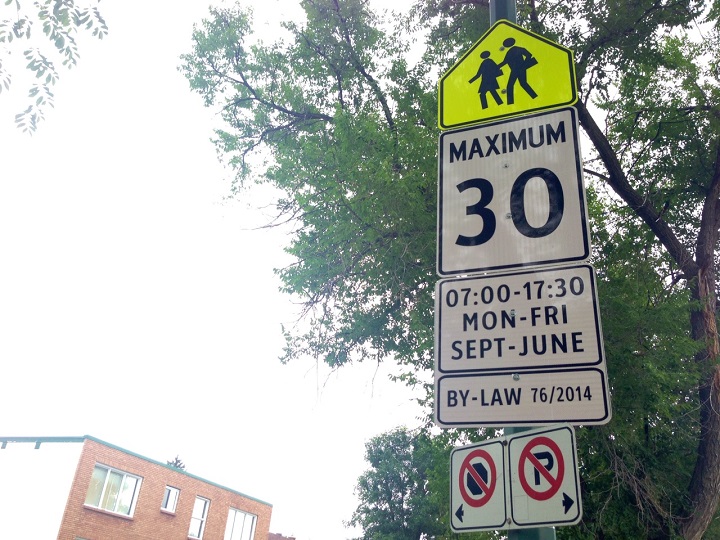Winnipeg is looking to cool drivers’ jets — potentially reducing speed limits on residential streets to 30 or 40 kilometres per hour.

City council’s public works committee will discuss a pilot project — a reduction to 30 km per hour from the standard 50 km/h on five residential routes as part of a speed limit review — at its next meeting July 7.
“(The public service is) recommending we would try those out, those five in Winnipeg, at 30 km/h and basically evaluate that and that would inform recommendations — they hope to be able to further study the question next year through a consultant,” said public works committee chair Coun. Matt Allard in an interview with CJOB.
In a public service report filed to the public works committee, the city estimated the trial would cost between $250,000 and $350,000. The funds would be drawn from the existing pedestrian cycling program annual budget and a $150,000 allocation to neighbourhood greenways — meaning the funds would fit within the already-approved 2020 budget.
The public service’s report comes after the province passed a bill in March 2019 that allows municipalities to set their own speed limits.
However, speed limits on residential streets in Winnipeg are fixed at 50 km/h in the Highway Traffic Act.
That fixed limit complicates the matter as the act requires signage for limits under 50 km/h at every intersection.
The report’s author, city transportation engineer David Patman, recommends council ask the province to change the act to allow reduced limits without as much signage. The report also recommends the city conduct a study starting next year on speed limits, including a look at what other cities have done on residential streets.
“Without an amendment, reducing residential speeds city-wide would result in thousands of signs being added to the residential streetscape — an undertaking which presents both financial and esthetic concerns,” Patman wrote.
Allard estimated the cost of required signage at $8 million.
Allard said he plans on lobbying at the committee level for the province to change the Highway Traffic Act.
“Basically we need a sign at every single intersection and so that has a huge financial implication, it would cost about $8 million to sign the city at different speeds, whether that would be 30 or 40 or any other speed,” he said.
- Canadian man dies during Texas Ironman event. His widow wants answers as to why
- ‘Sciatica was gone’: hospital performs robot-assisted spinal surgery in Canadian first
- Honda’s $15B Ontario EV plant marks ‘historic day,’ Trudeau says
- Several baby products have been recalled by Health Canada. Here’s the list
He would rather the city be able to place signage at the entrances to neighbourhoods to reduce costs.
“That’s going to be my number one request or fight on this report — really putting it out there to my colleagues that I think we should be asking the province for the power to do that — I’ve heard it described as ‘gateway signage,’” he said.
The proposed five-street study would see the limit reduced on:
- Roch Street from Poplar Avenue to Arby Bay
- Eugenie Avenue from St. Mary’s Road to Youville Street
- Warsaw Avenue and Fleet Avenue from Nassau Avenue to Lindsay Avenue
- Machray Avenue from Fife Street to Main Street
- Flora Avenue from Sinclair Street to King Street
Allard noted those routes are part of the city’s existing neighbourhood greenways.
“These are streets that are meant to be shared by cars and bicycles as part of our active transportation network,” Allard said.
Potentially reducing speed limits is meant to make roads safer, Allard said.
“You look at jurisdictions throughout the world, the trend is definitely toward reduced speed — the speed is probably more toward the 30 km/h option,” he said. “The argument for that is in terms of survivability of crashes — basically, at 30 km/h, you have a very good chance of surviving and any faster than that, death tolls are going up.”







Comments